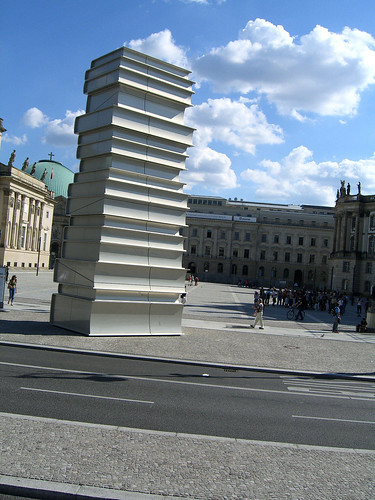More thoughts about broadening how we think about "The Central Library"
 Libros. Flickr photo Berlin by Pabloest.
Libros. Flickr photo Berlin by Pabloest.As regular readers know, I write a lot about the state of library planning in Washington, DC. We are undergoing a library system "revitalization," at least in terms of planning. And there are proposals to build a new central library.
Previously, I had suggested combining "city musuem," visitor services, and archives in one place. At various public meetings, other great suggestions came forth such as including a music and film projection quality theater (note that Arlington County is doing this with their addition of the Signature Theater to the Shirlington Branch of their library system and the Thomas Jefferson Junior High School-Community Center was built with theater and exhibition space sized to serve the broader community, not just the school).
See:
-- Central Library Planning efforts and the City Museum, how about some learning from Augusta, Maine ... and Baltimore?
-- Citizen's Summit and Libraries
-- More learning from Los Angeles -- L.A. Renews Its Libraries as Modern Civic Centers
and about tourism, cultural heritage, and the DC City Museum see;
-- Who ♥ DC? -- More about DC tourism
-- Tourism Marketing and DC
-- You (Don't) really like me--DC and its suburbs
-- More About DC Tourism Marketing.
Now, while the DC Library Task Force (DC Public Library System: A Blueprint for Change) bandies about new libraries in other cities such as Seattle as examples, they don't mention the fact that what they are proposing is a much smaller facility than the current main library, not to mention that the building proposed is much smaller than the stellar central libraries in other cities that they provide as examples.
So I no longer think it's possible to fit all this in a new central library building, especially one that is smaller, not bigger. But that doesn't mean we shouldn't plan and think more broadly (am involved with some stuff percolating about this in another realm...).
One of ideas that occured to me during the public meeting process earlier in the Spring would be to reach out to certain "independent" libraries in the city, and bring them onboard somehow. My idea was to offer them free rent for space in the "new" central library. The independent libraries would remain independent, but would agree to staff the facility to the same schedule that the building is open in return for the free rent.
One such library that comes to mind is the Foundation Center, which focuses its collecction and programming around nonprofit and fundraising matters. Currently this library is open business hours Monday through Friday, and is open til 8 pm on Tuesday nights. Tough hours to access for volunteers and members of community organizations...
Another thought that comes to mind is making a similar offer to Provisions Library and DC Indymedia, to open up and broaden access to a greater variety of perspectives.
Provisions has added a blog to their offerings. And it has some very interesting links to sites such as the Center for the Study of Political Graphics and the People's Protest Database of Vietnam War-era ephemera.
Similarly, I have written from time to time about the National Film Board of Canada and their public cinema-viewing places in Toronto and Montreal. Although the original suggestion was for them to do something similar at the Embassy of Canada, and add broader cultural offerings to that area of the National Mall-Penn Quarter.
See:
-- Call for Museums to stay open til 10 pm
-- The tension between high culture and low culture
-- Smithsonian Gift Shop Sales.
But this idea can be extended. What about moving the DC government Office of Cable Television and Telecommunications to the library complex (at least its "public broadcasting" function), DCTV, the public access channel, or Howard's or UDC's media training programs? Making the area more of a public media operation in some way. That's why DC Indymedia crossed my mind...
In college, the Michigan Student Union had one floor of space allocated to student organizations, for use on an application basis, emphemeral organizations as well as more long-lasting ones like the Rowers Group or the Student housing cooperative and the Ann Arbor Tenants Union were based there. Maybe there is a way to broaden our thinking about this in terms of the "public" library.
Index Keywords: libraries



0 Comments:
Post a Comment
<< Home